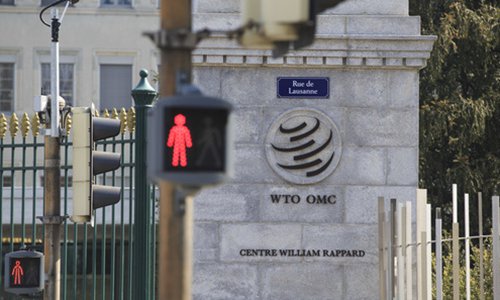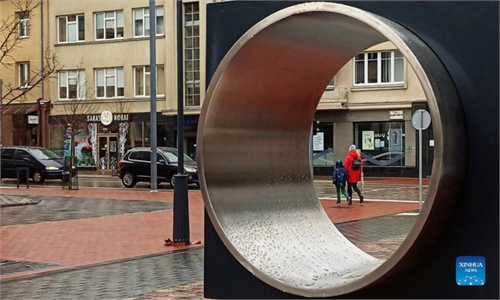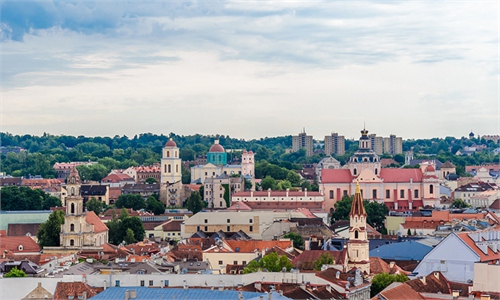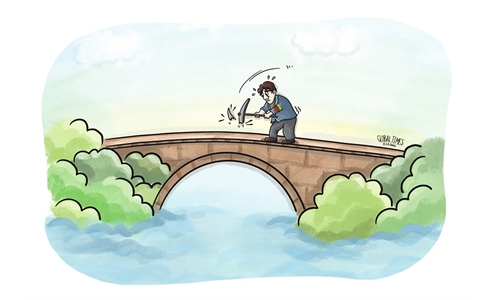Lithuania, Taiwan authorities stage political stunt at WTO, but fail to make any gain
Attempt to hijack meeting, smear mainland fails

File photo taken on April 2, 2019 shows the WTO logo on the main gate of the World Trade Organization (WTO) in Geneva, Switzerland. (Xinhua/Xu Jinquan)
Authorities from Lithuania and the island of Taiwan sought to stage a political stunt at a meeting of the WTO, as they deviated from the agenda of the multilateral conference and held a bilateral meeting to repeat claims of so-called "economic coercion" by the Chinese mainland.
Analysts noted that the pair appears to be seeking to hijack the WTO conference to air their grievances and draw more "global support," but they failed to make any meaningful impact and their attempt to smear and provoke the Chinese mainland will fail and could backfire.
On the sidelines of the WTO's 12th Ministerial Conference on Monday, John Deng, the so-called "top trade negotiator" of the Taiwan island, met with Lithuanian Deputy Foreign Minister Raimundas Karoblis, where they hyped claims that both sides have been "suppressed" by the Chinese mainland over trade and agreed to jointly resist the "economic coercion," according to media reports.
Experts said that such claims do not have any factual basis. Despite constant provocation by Lithuania and the separatist authority on the Taiwan island, the Chinese mainland has not announced any countermeasures in terms of trade. Any regulatory actions taken by the mainland are in line with global trade rules, experts noted.
For example, some overseas media outlets have been hyping the recent mainland suspension of grouper shipments from the Taiwan island. But the mainland's customs agency said that the move was taken after detecting prohibited drugs in such shipments multiple times since 2021.
"Lithuania's challenge of the one-China principle and enhanced interaction with Taiwan region was initially due to the political needs of a few officials, but after a certain stage, both sides must find so-called support and a better reason, which is the so-called economic and trade coercion claimed by both sides," Cui Hongjian, director of the Department of European Studies at the China Institute of International Studies, told the Global Times on Tuesday.
Lithuanian officials and the separatist authority on the Taiwan island have also been talking about expanding economic and trade cooperation. In that regard, Jovita Neliupšienė, Lithuania's deputy minister of economy and innovation, led a delegation to visit the Taiwan region, during which the Lithuanian authorities announced on Monday that they expected to set up a representative in Taiwan this fall, media reports said.
But evidence leads to the fact that there is little complementarity between the two economies, experts said, pointing to the tiny trade between the two, in comparison to their relatively larger trade with the Chinese mainland.
The room for cooperation between the Taiwan region and Lithuania is definitely limited, because the market capacity of both parties is limited, experts said.
"It is unrealistic for the Taiwan regional authorities to imagine that Lithuania can replace the mainland as a market for exports of agricultural and aquatic products, regardless of the size of the market or the cost of transportation. Economically, that's not sustainable," Cui said.
Meanwhile, as Taiwan authorities continue to collude with foreign forces to undermine the one-China principle, many Taiwan industries, including the semiconductor sector, are increasingly concerned about potential impact on their businesses, according to industry insiders.
"The contracted chip manufacturers must stay close to the terminal markets and there is no market like the mainland, which has the most potential and supply chain for sustainable growth," an insider in the semiconductor industry told the Global Times on Tuesday.



